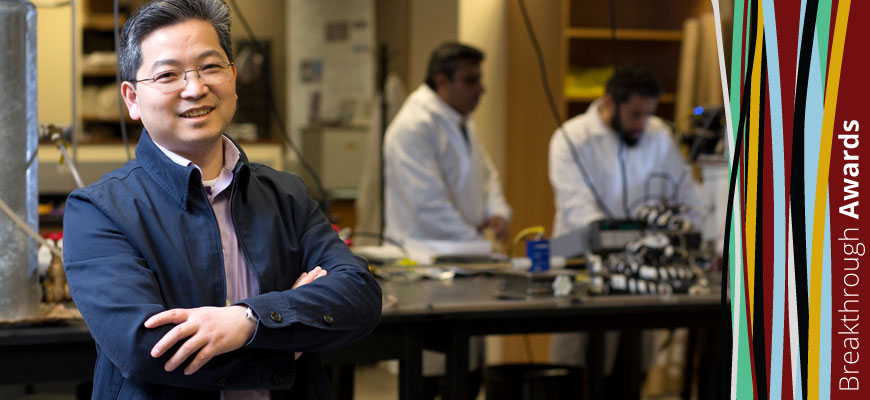
Keeping his cool
Engineering researcher Chen Li works on solving the problem of too much heat
Posted on: June 9, 2017; Updated on: June 9, 2017
By Chris Horn, chorn@mailbox.sc.edu, 803-777-3687
If there’s a problem with too much heat in an electronic system, Chen Li probably has a plan to cool it down.
The mechanical engineering associate professor has five patents related to heat dissipation technology and has garnered major research grants on the topic from NSF, DARPA and the Office of Naval Research for applications ranging from computer chips to power plants.
“We’ve achieved breakthroughs at the nano scale, using microchannels about the diameter of human hair to cool micro-scale chips from inside,” he says.
Tiny bubbles and liquid coolant circulate through the channels with the bubbles capturing and carrying heat away from the chips. Li and his team have patented a method for rapidly generating the micro bubbles and cracking them apart, as fast as 1,000 times per second.
On a larger scale, Li has worked on a conceptual plan to use air to cool power plants, a process that would drastically reduce the amount of water traditionally deployed for that purpose. His team has developed a prototype model incorporating a dripping system and condensation to dissipate heat by mimicking skin perspiration.
I’ve found one of the best ways to teach is to inspire students with real applications.
Chen Li
Li’s work on heat dissipation might one day make it even to the moon. NASA headquarters sent a senior fellow to visit Li’s lab to learn more about a technology he and his team have developed for generating steam in a gravity-less environment.
“Solar panels won’t generate enough electricity if we one day build a base on the moon,” Li says. “Generating steam on the moon didn’t seem possible, but we have found an approach that allows us to generate steam bubbles and release them, independent of gravity. NASA is very interested in this.”
Arid countries with access to the ocean will no doubt be interested in another of Li’s projects, which involves a flash system to derive freshwater from seawater. His new approach can use waste heat (excess heat generated from another mechanical process) or solar heat to flash boil seawater, a more efficient and less expensive proposition than traditional desalination methods.
Li’s research results often make their way into his courses where he teaches fluids and heat transfer at the undergraduate and graduate levels.
“I’ve found one of the best ways to teach is to inspire students with real applications,” he says. “We have a lot of equations in engineering, and it’s easy to get lost if that’s all you focus on. But you can show them promising applications and demonstrate, step by step, how the equations work and relate them to real life. That approach has been very well received.”